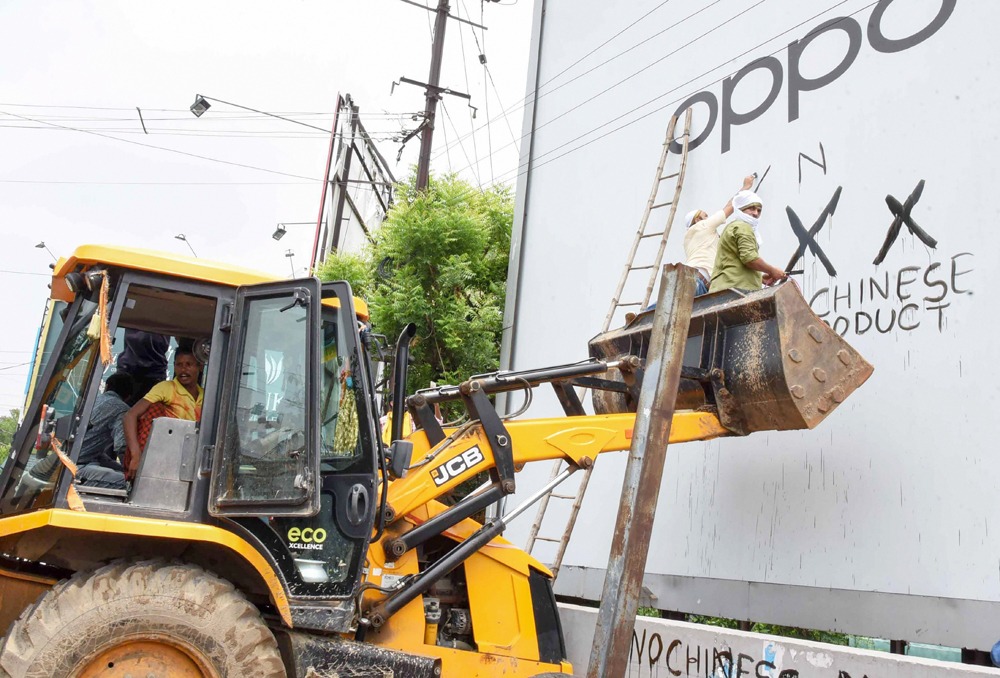The Modi Empire has started to lash out at the Dragon but a section of industry is deeply worried that jingoistic sabre-rattling is being used to overwhelm commercial business considerations.
After the carnage at Galwan Valley, the Centre has set about cancelling some contracts farmed out to Chinese companies, which had won them through a global bidding process.
As a first step, the Indian Railways has scrapped a Rs 471-crore tender given to a Chinese firm amid reports that the government intends to hit back at Beijing with trade barriers and additional levies on over 300 products. The Atmanirbhar Bharat programme has come in as a handy tool to raise a barricade against a flood of Chinese products that had swamped Indian enterprises.
The Dedicated Freight Corridor Corporation of India Ltd (DFCCIL) has decided to terminate the tender it granted to Beijing National Railway Research and Design Institute of Signal and Communication Group Company Limited (BNRRDISC) and ascribed its decision to “non-performance”.
The bigger worry is that the anger that has swelled against Chinese products could badly hurt telecom players in the country.
Officials in the department of telecom have indicated they would soon advise the telecom players to stop using Chinese equipment, which will have an immediate impact on plans to roll out 5G technology in the country.
The Cellular Operators Association of India director-general, Rajan Mathews, told The Telegraph: “Geopolitical issues are the provenance of the government and such decisions are distinct and should ideally be kept separate from commercial decisions, which are the provenance of companies.”
Mathews believes that the choices that companies make are dictated by their desire to provide the best possible service at a reasonable price to their customers while also protecting the interests of their shareholders.
“When the government makes laws, companies are duty bound to adhere to them. To date, the government had not mandated the exclusion of any vendor equipment from private operators’ networks,” Mathews said.
Sources said officials in the finance and commerce ministries were discussing strategies to curb imports from China through a mix of tariff and non-tariff barriers.
They said the government was considering raising import duties on 160 to 200 products and imposing non-tariff barriers — such as licensing requirements or stricter quality checks — on another 100.
The decision will target imports worth $8-10 billion with the aim of deterring non-essential, lower-quality imports that render Indian products uncompetitive.
Dependent
Analysts are, however, uneasy about a policy that tends to view economic relations through a chipped prism of hyper-nationalism.
China sells crucial machinery that add to domestic manufacturing and exports. These can be replaced over the next 5-10 years but not immediately.
Analysts believe that both nations have invested heavily in each other. “We are dependent on China in certain industries where there are no alternative sources available. We have to take measures in a calibrated manner as intermediaries boost India’s export competitiveness. There will be a lot of talk on boycotting Chinese goods but the market will take its own course. So as long as there is demand, there will be Chinese suppliers to meet that demand,” said trade expert Biswajit Dhar of Jawaharlal Nehru University.
“While the government talks of the ease of doing business, it has put restrictions on investments from China. Much of the investments are being routed from Hong Kong, a Chinese special administrative region that enjoys certain privileges, and third countries like Singapore. Any aggressive move to identify the ultimate beneficiaries behind certain groups of investors will only increase the cost of doing business and make the country a less attractive destination.”
Phone & auto parts
In 2017-18, China met almost 60 per cent of India’s import requirements for electrical and electronic equipment.
In the smart phone industry, four of the five bestselling mobile phone brands are from China. Together, they account for 60 per cent of India’s smart phone market.
Around 30 per cent of India’s automobile components come from China and about 90 per cent of the country’s demand for toys is met by China.
Over 100 Chinese firms have bagged huge projects in India including Sinosteel, Shougang International, Baoshan Iron & Steel, Sany Heavy Industry, Chongqing Lifan Industry, China Dongfang International, and SinoHydro Corporation.
Retaliation risk
Analysts said the government would also have to consider the prospect of retaliatory action against Indian drug makers like Dr Reddy’s Laboratories, Aurobindo Pharma and Matrix Pharma, and IT majors like NIIT, Infosys, TCS, APTECH, Wipro and Tech Mahindra.
Trade deficit
In 2018-19, India’s exports to China amounted to just $16.7 billion while the imports were $70.3 billion, leaving a trade deficit of $53.6 billion.
Moreover, China’s exports to India account for only 2 per cent of its total exports. So even if Indians boycott all the goods imported from China, it will not have a huge impact on China.
India’s imports from China are mostly made up of capital goods like power plants, telecom equipment, metro rail coaches, iron and steel products; finished products like fertilisers, refrigerators, washing machines and air-conditioners; intermediate products or components for a number of industries like electronics and mobile phones, autos, pharmaceuticals, chemicals and plastics, engineering goods, etc. The use of these intermediate products makes India’s products competitive in the global market.
However, India’s exports to Beijing include raw materials or primary products like iron ore, and agricultural products, with only a small proportion of manufactured or value-added products.
Chinese investments
A report published by Gateway House, a think tank associated with the Indian Council on Global Relations, has estimated $4 billion of Chinese tech investment in Indian start-ups. The Alibaba Group alone has strategic investments in Big Basket ($250 million), Paytm.com ($400 million), Paytm Mall ($150 million), Zomato ($200 million) and Snapdeal ($700 million).
Similarly, Tencent Holdings, a Chinese conglomerate, has invested in Indian firms like Byju’s ($50 million), Dream11 ($150 million), Flipkart ($300 million), Hike Messenger ($150 million), Ola ($500 million) and Swiggy ($500 million).











